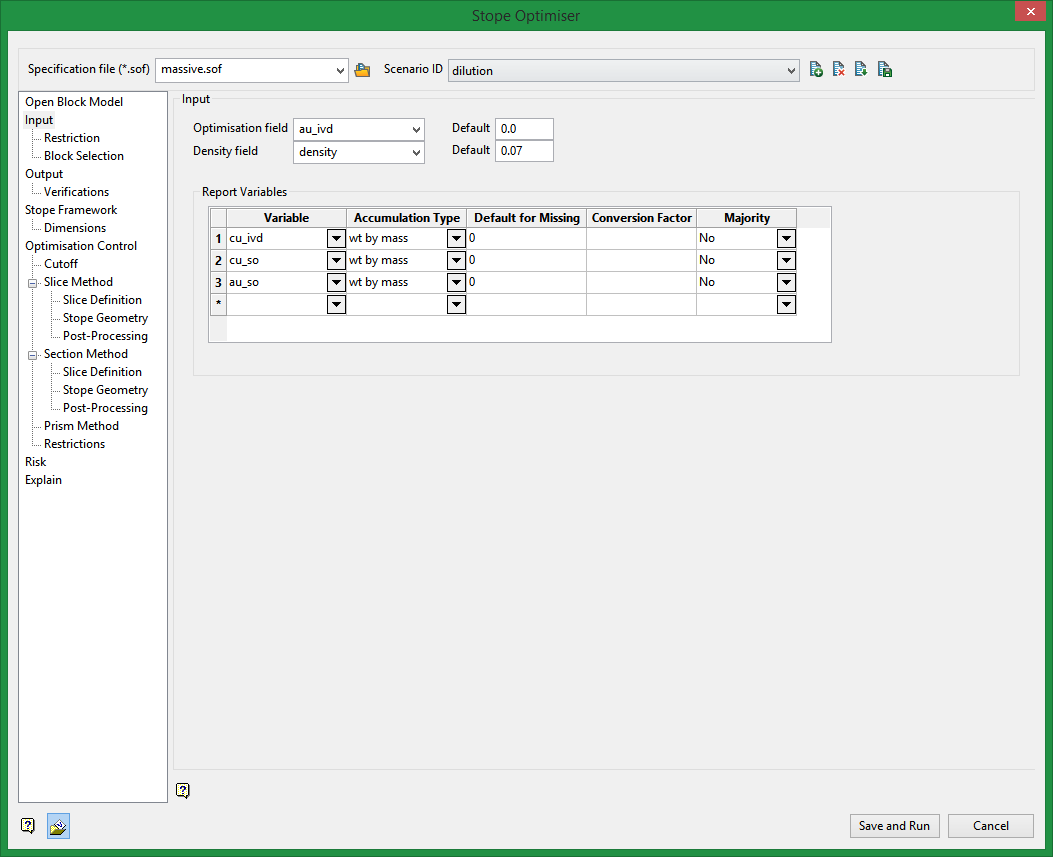Input
Use Input to populate the density, optimisation, and exclusion fields from the stope’s input block model values.
Requirements
A block model must be selected from the Open Specification page.
Instructions
On the Underground menu, point to Analyse, click Stope Optimiser, and then select Input from the tree menu on the left to display the Input pane.

Input
These fields are used to define the input data from the block model.
Optimisation field
Use this field to select the optimization variable from the block model. Stopes will be optimised in respect to this field in the specified optimization parameters. This is typically a grade or value type variable. You will also need to define a Default that will be used when the model cells do not fill the framework space, or a grade value is not defined for a given block. This is a required field.
Note: If you would like to optimise a scenario with multiple products, you will need to create an equivalent variable and use that for your optimisation field.
Density field
Use this field to select the density variable from the block model. You will also need to define a Default that will be used when the model cells do not fill the framework space, or a density value is not defined for a given block. This is a required field.
Report Variables
Variable
Use this field to specify which variables you would like to report on. For example, if you are optimising based on gold, but would also like to know the average copper grade in the output stope you would select your gold variable for the optimization field and your copper variable for one of your report variables.
Select from the drop-down list the desired input variable. The available variables from the currently loaded block model are listed.
Accumulation Type
Select from the drop-down list the desired input type. Each variable can be specified as weight by mass, weight by volume, or sum.
Weight by Mass (wt by mass)
This accumulation type should be used for variables which are weighted by mass (Ex., grams per tonne)
Weight by Volume (wt by vol)
This accumulation type should be used for variables which are weighted by volume ( Ex., lbs. per cubic foot)
Sum
This accumulation type is used for variables containing units ( Ex., grams of gold) that should be cumulated rather than averaged.
Default for Missing
Enter the value that will be used as default when the model cells do not fill the framework space or a value is not defined for a given block.
Conversion Factor
Use this option to convert your data on the fly for reporting purposes. If you have gold in your block model measured in grams/ton, but you would like to report it in oz/ton, you can put in the appropriate conversion factor to have the output report in oz/ton.
Majority
Select from the drop-down list whether this entry shall be Majority, Ranked, or select No if the variable is in the average. This should only be used for integers and text entries, for example: rock type. The field value with the greatest tonnage contribution is reported for characteristics such as resource category, geological domain and ore types where a weighted average is not appropriate.
Related Topics
Section Method Slice Definition
Section Method Post Processing

